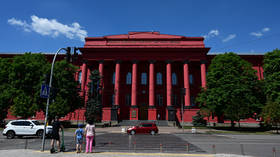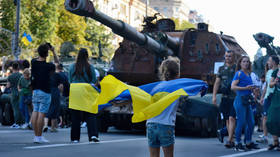Kiev’s top university bans Russian language courses

The Taras Shevchenko National University of Kiev (KNU) has scrapped Russian language and literature courses, as well as banning Russian scientific sources, the KNU’s rector, Vladimir Bugrov, has said.
The decision to ban the Russian language at the largest higher-education institution in Ukraine was “absolutely correct” from an “ideological” and “decolonization” standpoint, Bugrov claimed in an interview with Ukrainian News agency, published on Tuesday.
“Russian language and literature, Belarusian language and literature, and Farsi (Persian) were studied at our Institute of Philology. We closed these programs last year. But this was an emotional step,” Bugrov explained.
The KNU has also banned the use of Russian-language scientific literature, the rector revealed. While historical sources in Russian are still in use, the university is striving to switch to English-language literature for exact sciences, he said, admitting it was a “very costly” process and lamenting the absence of any state-level programs to prop it up.
However, Bugrov admitted that it was not possible to abandon Russian studies at higher-education institutions entirely, given that neither Russia nor Belarus will “disappear,” even if Kiev wins the conflict against Moscow. Instead, Russian studies should be tweaked and become an analogue of the Cold War-era “Sovietology” studies in the West, the rector suggested.
“But just as we study viruses, including pathogenic ones, in our medical department or at the biology faculty, Russian literature should also be studied in one or more universities,” Bugrov stated.
He also said he was “absolutely convinced” that Russian language and literature should not be studied at the country’s schools.
The remarks follow a recent damning survey, conducted by Spilnomova, a Kiev-based NGO that propagates Ukrainian and seeks to change “the language situation” in the country.
The NGO surveyed kindergartens in Kiev, and found that around 20% of local preschoolers do not speak Ukrainian at all, using Russian instead. Only 15% of Kiev preschoolers were “actively speaking” the country’s state language in daily life, while the rest were using a mix of Russian and Ukrainian.
The situation in the city’s schools, according to the NGO, appeared to be even worse, with teaching only in Ukrainian effectively having no impact on actual language use by teenagers, who still largely continue to speak Russian despite all the efforts to promote Ukrainian.
Ukraine embarked on an extensive, state-sponsored campaign to break cultural and historical ties with Russia following the 2014 Maidan coup, which prompted a conflict between Kiev and then-Ukrainian Donbass, as well as causing Crimea to break away from the country and reunite with Russia.
The efforts to phase out anything even remotely Russian have accelerated further since Russia launched its military operation against Ukraine in February 2022.
Moscow has repeatedly condemned Kiev’s attempts to destroy common cultural and historical ties. President Vladimir Putin cited “the de-Russification and forced assimilation” of local Russian native speakers – more than one-third of Ukraine’s population – among the causes of the ongoing conflict between the two countries.














